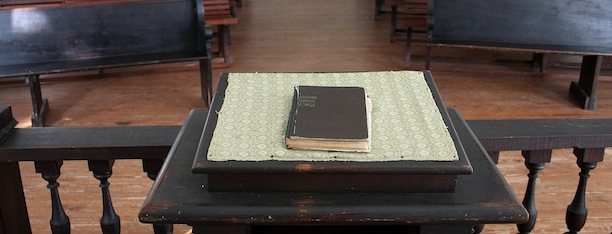When Belief Becomes Unbelief
From John Updike’s In the Beauty of the Lilies, in which Reverend Clarence Wilmont confesses his loss of faith to his wife Stella.
“My faith, my dear, seems to have fled. I not only no longer believe with an ideal fervor, I consciously disbelieve. My very voice rebelled, today, against my attempting to put some sort of good face on a doctrine that I intellectually detest. Ingersoll, Hume, Darwin, Renan, Nietzsche—it all rings true, when you’ve read enough to have it sink in; they have not just reason on their side but simple humanity and decency as well. Jehovah and his pet Israelites, that bloody tit-for-tat of the Atonement, the whole business of condemning poor fallible men and women to eternal Hell for a few mistakes in their little lifetimes, the notion in any case that our spirits can survive without eyes or brains or nerves—Stel, it’s been a fearful struggle, I’ve twisted my mind in loops to hold on to some sense in which these things are true enough to preach, but I’ve got to let go or go crazy. I love you for feeling otherwise, and would never argue a man or child out of whatever they believe, but to me it’s all become relics, things left over from our childish nightmares, when there’s daylight now all around us—this is the twentieth century! I can’t keep selling myself and others the opposite of what jumps out at me from every newspaper and physical fact I see. The universe is a hundred percent matter, with the energy that comes in waves out of matter, and poor old humankind is on its own and always has been.”
She had turned from the mirror to gaze at him. Her mannish, heavy face looked oddly seductive, her lids half-closed. Her low hairline gave it a brutish cast: her head’s gleaming bounty, with its chestnut highlights and buckling waves, sprang from a line straight across her brow, without a hint of widow’s peak. “Clarence, have you tried praying?” She told him, “Reason isn’t everything. There are things beyond it. Believing isn’t supposed to be easy. What did St. Paul say? ‘We see through a glass darkly.'”
Her tone of soft pleading, somehow sexual after these many years of their laying their bodies to one side, drew him closer to her. He lowered his voice, which felt raw, as if tear-scoured. “St. Paul,” he said, “said many excellent things. ‘For the Jews require a sign, and the Greeks seek after wisdom: but we preach Christ crucified, unto the Jews a stumblingblock, and unto the Greeks foolishness.’ I love the old words, but now they lie dead in me. I don’t quite know what has slain them—the infidel modern times, perhaps, or simply my years, it may be, and the fatigue with which the years tax my system—but dead the words are, as dead as the bones in the valley of Ezekiel.”
“But those bones lived,” she said quickly. “That is the point of the story. With God all things are possible. Perhaps your fatigue will pass, and these doubts with it.”
“They are not doubts, alas—they are certainties. I cannot continue in the Christian pulpit, and be a Benedict Arnold in the camp. I fear if I continue to speak I will take hope and reassurance away from those that can still believe.” And, as if proving that bones can live, he felt his eyes water and a convulsion of grief long held within himself overtook his face and shoulders; he sat on the edge of the bed, and she with him, setting a hand on his thigh.
“Poor heart,” she said. “For how long have you been thinking these hopeless thoughts?”
Although Clarence is a fictional character, he has many real-life counterparts. Read the illuminating “Preachers Who Are Not Believers” in the March 2010 issue of Evolutionary Psychology.
[Post image: Up on the pulpit by madmaven on stock.xchng]





Angie Cox
“…he felt his eyes water and a convulsion of grief long held within himself overtook his face and shoulders…”
I know that one all too well.
Elissa
Me, too. Especially when I read the article I linked to (at the end of the post).
Sylvia
I too know that feeling all too well.
Elissa
You and me, sister! xo
Cherie
Elissa, thanks for the link to the article. Although I’m still a believer, I’m not one in the “conventional” sense in that I dislike the literalism and interpretation that we are fed. Like the Baptist preacher in the article, I recently started reading through the Bible – I had only read the New Testament before – and am actually stunned by what it contains and question how it is presented by many churches. As the reverend says, ” I’ve twisted my mind in loops to hold on to some sense in which these things are true enough to preach, but I’ve got to let go or go crazy,” I too am tired of the loops that we have to navigate.
Elissa
Yes, I’m not sure where I am, either, but you’re absolutely right. The Bible is contradictory, to say the least, and it makes it difficult to come up with iron-clad arguments about it…
Thanks for sharing where you’re at…